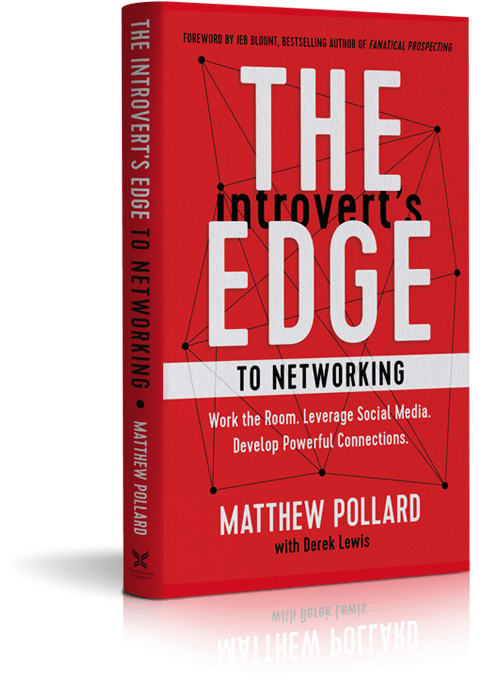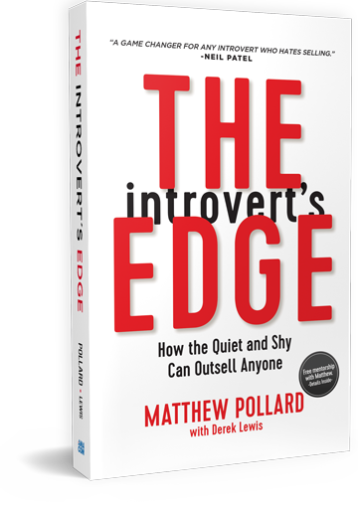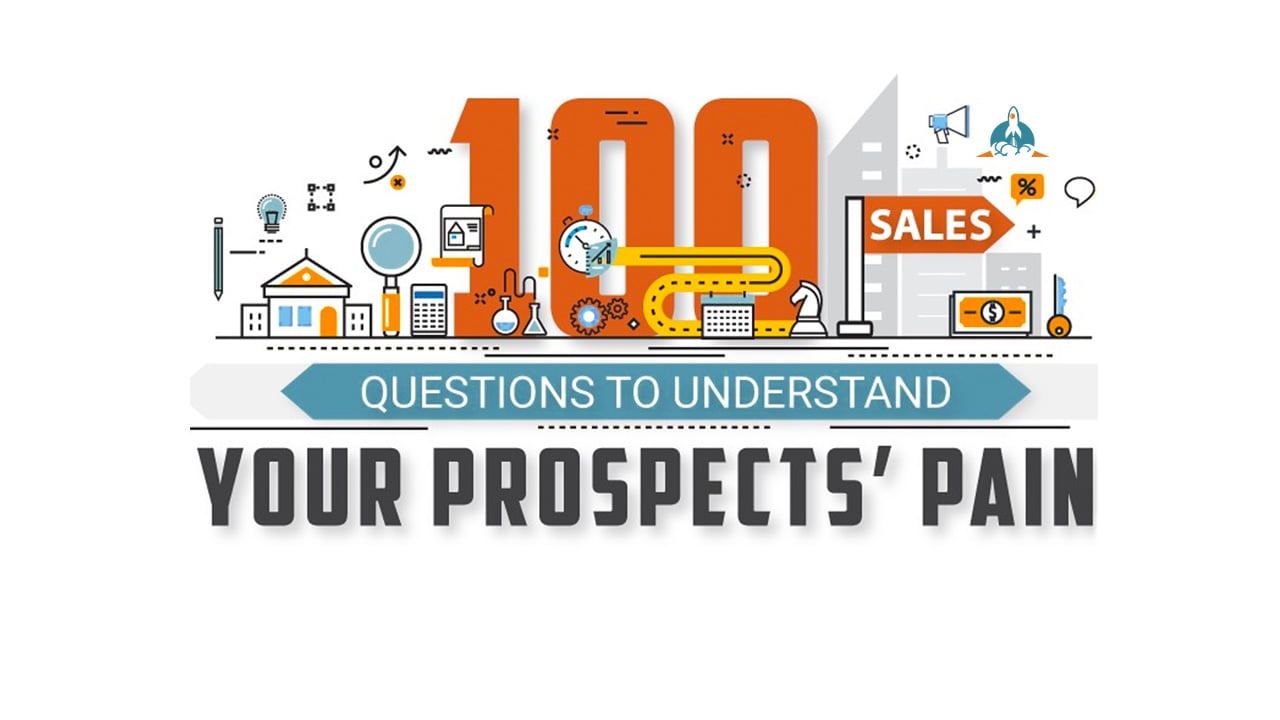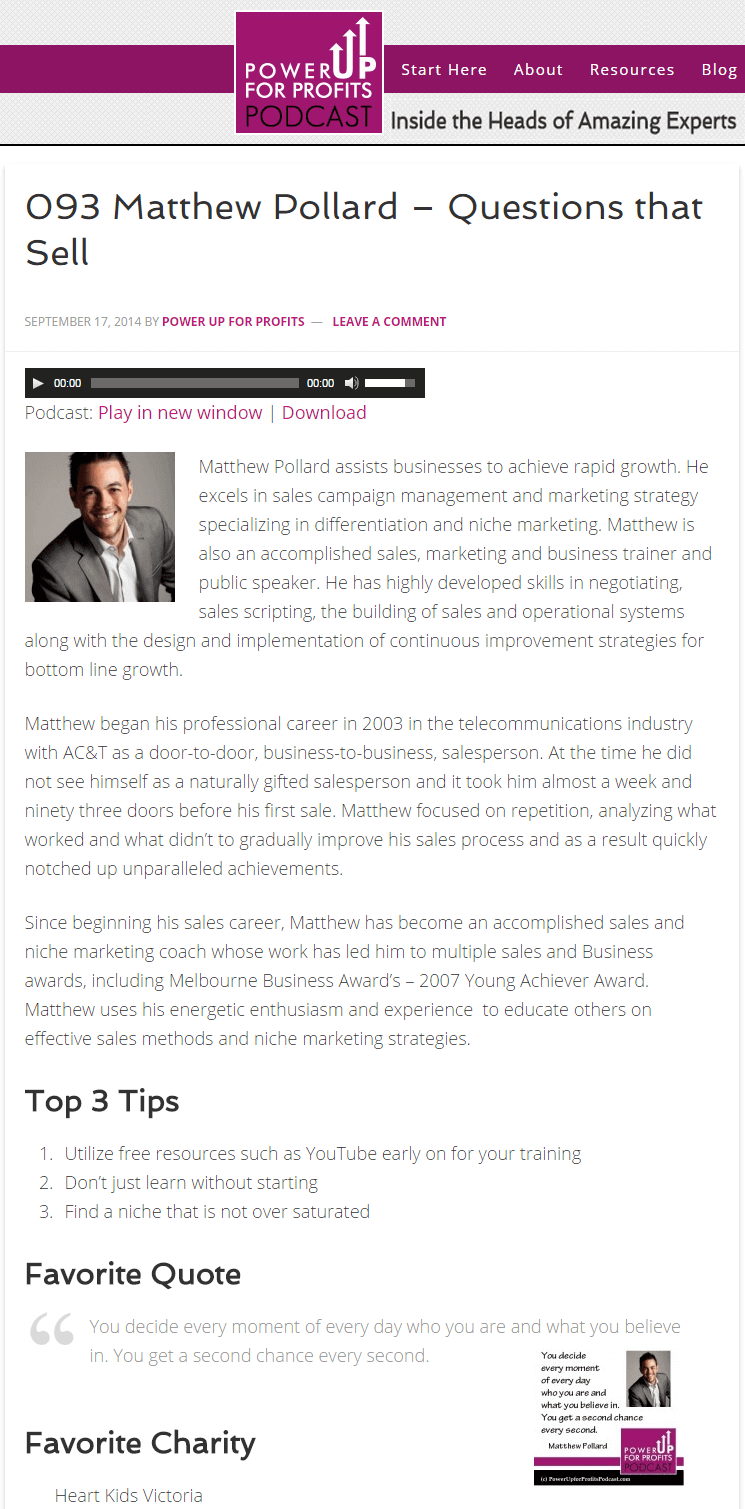Power Up For Profits Transcript
Kathleen: Hey, hey, hey it’s Kathleen Gage again, with Power Up For Profits Podcast. Where we bring you the best of the best from around the globe who are out there making a difference and making a great living in the process. Matthew, it’s great to have you here.
Matt: It’s great to be here.
Kathleen Well, I want to dig right in and, and I want to first of all address the whole issue about sales. And as you started in your sales career early on, you had to knock on a lot of doors, and most people would have given up after 4 or 5 doors and being told “no.” What, what was inside of you to make you keep knocking on those doors until you got that first sale?
Matt: The easy answer is I didn’t have an option, and I think when you look to a lot of people that made it successful in business and in sales – because to be successful in business, we know we have to be successful in sales. And still a lot of people have a situation that happens where they need to go out and make money. Or like maybe they’ve been retrenched from work? Perhaps they just had a child and they need to make more money. And all of a sudden, they start to turn their life around – because they have to.
For me it was different. I was a very introverted kid. I really didn’t have that sales ability by any means. What happened though was, I decided to go for a real estate agents traineeship. And primarily for that was just because I grew up as a dyslexic child. I actually had what’s called (1:15?), which basically means I couldn’t read all that well either. I decided to take a year off before I went to university, just to do this real estate agents traineeship. More so for a stop gap between going to university.
And for me, that was the perfect solution – until I found out that they were going to close, because they weren’t making enough money just before Christmas. I’d only worked there for a few weeks. I needed to get a job very, very quickly. And the only job that you could get during that period were door to door sales jobs. I had no option. I didn’t have a family that was rich enough to be able to support me. I made a commitment to everybody I knew that I was going to start a career – I just had to push on and do it.
Kathleen: So what were you selling early on? At that first door to door sales job, what was it you were selling.
Matt: It was telecommunications. I started in this job, it was a commission only job selling Optus. Which is your equivalent of AT&T. It provides cell phones, landline telephones and internet. It was in the stage where there were lots of people out there doing it. People were walking down from door to door trying to sell telecommunications and offering call rates. And that was pretty much how I learned it and what I was (2:12?) taught to do.
Kathleen: So in all of the door knocking and the wearing out shoes and all of that, what is – what would you say has been your greatest challenge in all of that? Because you obviously have become very successful in sales and marketing. But there must have been some challenges along the way. What would you say has been your greatest one?
Matt: To me, at least it was understanding that sales is a learnable skill like any other. Because I didn’t have an option, I was forced to research how to sell. I didn’t have any money, so I couldn’t go to a seminar, I couldn’t hire a professional coach. So what I utilized was YouTube. Every day I would be knocking on doors, and every night I would be at home watching YouTube for better ways to do it. I would be modeling off people that I saw that were in the business.
When I started, there were very few people there. A lot of people had quit. Commission jobs are hard, a lot of people at that time were saying the market was saturated. So I didn’t exactly have a lot of positive role models, and YouTube was all I could really go to. For me it was a learning curve of understanding, “Okay, sales may be a skill set that you’re born with or you’re not. And if that’s the case, completely it (3:16?) effects, and there’s nothing I can do.” So I had to assume that it was a skill like any other. Like you would go to university to learn to be a, a brain surgeon. I would learn how to become a sales person from educating myself the same way.
And getting over that ideology that sales was a skill set that you were just born with was probably the hardest thing. Once I got past that, I realized that it was a set of steps and something that could almost be completely scripted. And once I started to realize that, I created a complete sales process, a complete sales script. And every single time I went in with a customer, I looked at what worked, what didn’t work, what I could change – and then just follow the process. At McDonald’s they teach you to say, “Do you want fries with that?” It’s ridiculous but possibility is that the person will say “yes,” if you ask. And if you don’t, they won’t. What I learned is that in all forms of questions and conversations, you can create the best form of outcome by scripting most of the process. And that’s what I started to do.
That really started my career, because what I realized is no one else did that. You had natural people that just came in and tried to set the world on fire. You had people that weren’t natural sales people that came in and went, “Oh hell, I can’t do this,” and leave the job. And all I did was structure it in a process. As a result of that, my sales were beating the natural people, because even they had bad days, I never did. And then I started teaching that others.
Selling Techniques
Kathleen: Interesting. Well let’s start with who some of your role models have been. When you were, early on going onto YouTube. And good for you for figuring that one out, because a lot of people, they give up. They say, “There’s no answer.” And you said, “There’s got to be an answer.” So you found it through YouTube. Who were some of your early mentors through YouTube?
Matt: I actually found a guy called Kerwin Rae. Kerwin Rae had a question process. That’s one of the stages of the sale that I find is the most monstrous. It has the most giant impact on the outcome of a sale. And what he taught me was how to ask questions in the right way to get all of the ammunition you need to then sell.
What commonly happens in the sales process is people are uncomfortable with it, and that they have no idea why the customer wants the product. However, because they’re uncomfortable, they don’t ask any questions. They go in, they introduce who they are – especially in a cold call. Even in appointments though, they introduce who they are. They then start talking about their brochure and trying to sell a product.
Now solution sales, which is what I call it starts with a massive process. I mean obviously you have to build rapport. And the most important part is asking questions. Asking what their business does, how their business does it, what their key objectives and goals are, what are problems that they experience in their business? And obviously these questions differ depending on the business that you’re out there speaking to, what product you’re selling.
However, asking the right questions – when you then start talking about your product, you can then turn that into talking about benefits rather than features. Because if you don’t know what their business does, you can’t talk to them about how this product or service that you offer will help their specific needs. Therefore you’re not differentiating – you’re just a brochure salesperson. And that is, by far one of the biggest problems in sales.
Sales Coaching Questions
Kathleen: So when you’re working, when you’re mentoring somebody or somebody comes to you and they say, “What programs do you have?” What do you recommend to people who really want to learn sales based on your strategies? What kind of programs do you have? What kind of mentoring do you do?
Matt: There are a couple of ways to work with what I do and my strategies. The first thing is, on our website danandmatt.com/free – you can access some free videos on sales strategy. I’m also, at the present time, very shortly to launch a whole seminar series on matthewpollard.com. Which will cover off on sales strategy, niche marketing, and how to script a sale – along with a lot of things like time management and team development. Because once we start to get good at sales, we have to obviously start to teach that to a team.
Secondly, a lot of people say to me that they don’t have time to sell, because they’re too busy doing their day to day. And without sales and marketing, we can’t grow. So those are some great ways to get in contact, through those 2 websites. A lot of people though, I do consulting with. I’ve been consulting for a number of different clients. From ghost writers to PR firms to people that put furniture in deceased estate. And predominantly, a lot of these businesses – one man bands, all the way up to 40, 50, 100, 200 employees.
And I actually had a ghost writer, Derek, I’ve been working with recently. Who, when I first started speaking with him, he hadn’t had a client in 4 or 5 months. And he was a very good ghostwriter. His problem was that he couldn’t get clients, he just wasn’t a salesperson. We had 3 consultation phone calls. After the first call, he went off and he secured $35 000 worth of business within the first week. Before our fourth call, he’d achieved $80 000 worth of business – and we’re talking within the period of about 6 weeks. And you’ll see his testimonial on the matthewpollard.comwebsite. What we did is we got on the phone, and he gave me a couple of examples of how he spoke to clients. And we just strategized and worked on what I call “the low lying fruit” first. What we can do to get him 60% better, before we even look at scripting.
We looked at why he wasn’t getting any customer calls. And he had his price on the website, without talking about why his services were so fantastic. I mean you can talk about that, but unless you’d actually physically have a phone call with a client, the price is always going to be a deterrent. So I took it off, and his reason for why it was there was, “I keep getting lots of clients call me – but when I tell them my price, they’re not interested. And I’ve just spent all this time talking to them. So I put my price on the website to make sure that only the real interested people call.”
Well the real interested people were calling. He had just decided either – A, they weren’t really interested. Or B, he had the problem with the fact that his sales pitch – and what he did, was just talking about what he did and how much he cost. As opposed to asking why they were interested in the book? What interested them and where the book was going to get them? And then selling his story to those specific objectives of the client.
Consultation is the advanced way to do it. Because a seminar series, which is what I’m creating at the moment – will get you a lot of the way. The tailorization is the next step. And so people that have the ability to be able to be able to afford professional coaching – it’s the accelerated course. Because if you can start making real change real quick, then that’s what you’re trying to do. Because the money that you receive in will always pay for consultation, otherwise the coach isn’t good at their job. Especially in sales coaching, because business consultants will go in and look at how you can save the bottom line and how you can improve the process. A sales coach should be able to create massive change within a very, very short period of time.
Kathleen: That’s a great, great example of how you’ve worked with somebody. And in the time that you’ve been in sales, what has been the craziest experience you’ve had with a client or in closing a client?
Matt: I actually had a mobile phone company, was my first business. After working for AT&T, I’d opened up my own telecommunications dealership. And I grew that to the largest national dealership for business to business mobiles in Australia within 3 years. I was about 20 or 21. And I was in South Australia opening up a new office and training some sales consultants.
The first thing that happens, is whenever you take somebody with you to see how you sell, the person that you’re talking to knows that you’re good at your job – because you’re the one training. So therefore, you must be very good at selling to people. So the first response you get is, “Oh no, no, I’m not going to buy anything today.” “Fine.” Anyway, I went through the sales pitch and I just asked the right questions, and I went through the full strategy. I told the consultant before we went into the door, “What you need to do is just follow the program. Even when you think the program is not going to work, just follow the process.”
Sales Process
And what I did, is I just went through my 7 steps. And whenever I train someone, I train somebody on 7 steps. Sales really is about 14. But to get you 90% of the way there, and to cut the learning curve in half, we focused on 7 first. And we went right through the 7 milestones of the sale. I then got to the end, and I asked all the right questions And I lined up the sale to the point where a customer would either have to say – no, I either lied to you in some of my questions, or I’m just not going to buy with you on the day because I don’t want to do it. As in, “I won’t buy on the day, but call me tomorrow and I’ll sign up.”
And we went right through, and I just started following him with the sales paperwork. I asked the right questions, I go through the sales pitch. And then I say, “So what our process is, we just grab a couple of quick details down just to make sure you qualify. Now do you have your driver’s licence here? Perfect.” Or, “Do you have your ABN number, which is your equivalent of EIN number. “Perfect, do you want to go and grab that?” And then I just look down and start filling out paperwork. Call it an assumptive close.
And the customer just walks off and gets it. When he comes back, or she comes back – they realize that they’ve made a decision. They hand you the document, and their brain has just converted to, “I’m not going to make any decision to – I’ve obviously made a decision.” Which I didn’t ask. And at that time, I learned that if you don’t ask for a sale, and just assume that you’re going to get it and start following the process – customers just sign on the dotted line.
And I integrated that into every sales process that I did from that point. And what was funny about it is, when we were leaving – there was a husband and wife couple. And they commented on how good I was at my job. And I said, “How do you mean?” And they said, “We both promised each other that we would not sign anything on the day, and we never do. But every time we have a salesperson come into our door, we always remind each other that that’s not what we’ll do. We also have 3 or 4 brochures from other sales people, because we’ve had them in here before you. We don’t sign up on the day. Yet you asked us those questions. We just felt comfortable. When you said, ‘Do you want to go and grab your ABN number?’ We just got up and went and got it. So the only thing I can say is that you’re very good at what you do.”
Kathleen: That’s a great story, I love that, I love that. Well let’s say that somebody who has a business and they’re doing okay, but they know they need to improve on sales. What would be 3 solid tips that you could give them? And not just, “Here’s what you need to do.” But, “Here’s how you need to do it.” What would those 3 tips be?
Matt: The first thing I would suggest is, before you start paying for professional advice, always cut the learning curve by doing the free stuff first. Especially when you’re a new business or a growing business. I am a big supporter of getting some of the knowledge before you decide to take on consultations or coaching. And also, if you hop on YouTube or – there’s podcasts available. You can always find out who you identify the most with that way as well. On that note, danandmatt.com/free. There’s a lovely video there on sales and the 7 steps that I’ve spoken about of the sales process.
So again, going out and actually looking for help and starting building things. Taking action is the first step. The second thing, don’t spend all of your time trying to learn the process and never start. A lot of people just say they’re going to learn – and keep learning. I know people that have read 20 sales books, and they still haven’t written a sales script.
I would also suggest that people find a niche. A lot of people say, “I need to learn how to sell.” What I learnt on my first business and my second business was – what I needed to do first was take a backwards step and look at who I was selling to. With the ghost writer, I found he was selling to everybody. As a result, his website was not specific at all. And when he spoke to people, he kept it (14:07?). What I found was he was essentially better – a technical writer, and had a lot more testimonials for that. So as soon as we created a specific niche and started marketing all of our attention to that, that’s where things turned around. And again, that doesn’t take a long time.
With telecommunications, I found tradespeople didn’t have time to go into stores and time to sit on the phone. However if I sent a consultant to their trade site, I would sign up people on mobile phones – and they’d done no research, which means I made a higher profit. So while the market was saturated, I still made a substantial profit and had a growing business while everyone else was shrinking.
When I was in education, and I helped (14:41?) a school – your equivalent of a college. Grow to one of the fastest growing schools in our country, by finding the market of non-professionals. Everybody that was (14:50?) degree qualified would always go to an MBA course. Anyone that was a tradesperson would always go to trade school. But anybody that hadn’t had a degree and needed management training, we found a lovely niche within that. And again, the market was saturated – you would safely assume that because it’s education there’s lots of professionals there that are smarter than I am. That are actually working on the marketing strategy of the business.
However, everybody just does what everybody else does. And everyone just gets on that bandwagon. So the specific advice I would give you, or to anyone. Is to think about who has a need that isn’t being met in that current industry? If you’re in education, you’d say, “Okay, we’re going to go for non-professionals. If you’re in book writing, you can say, “Well there’s lots of people that write books, however there’s very few that are technical book writers. The PR company I work with, he’s a solid Christian. And what we found was there’s a lot of Christian businesses out there that want PR companies, but they want to make sure it’s aligned with their values. That little small difference got them in the door and got them more clients very, very quickly.
So finding a niche, I would say – before you get, even get to the sales process. And then integrating it into your script to differentiate yourself from everyone else. Would be probably one of the most profound things you can do for any business.
Kathleen: Wow, those are great insights. And I love how you give examples with it. It’s like you’re not – you don’t just make a point, but you really hit the home run on that by giving an example. Now just as kind of sideline, what do you do in your spare time? When you’re not working, when you’re not selling – what do you do in your spare time?
Matt: I do a lot of travel. Last year I spent all year traveling the world. So I spent 3 months in South America, 6 months in the US, and 3 months in Europe. But actually 12, 13 days’ time – I’m hopping on a plane to Paris, and doing some more traveling there. My girlfriend and I love to travel, so that’s a great thing for us to do. I actually am one of those people that just really gets off on the idea of business (16:41?). I still will watch a lot of business documentaries and that sort of thing.
However, one of the major things I do – what might be surprising. Is I’m actually incredibly introverted. My conversational structure, the way I talk to people is completely strategized. When I sell to people, it’s completely strategized. And when I run seminars, or when I do public speaking – which I do quite a lot in different countries. I do a lot for the different economic development departments (17:03?) in Australia. And when I do all of that, that’s great. I need to defuse. And the way I do that is I love just chilling out, watching a movie and having a day at home or a day at the park. And just having time where it’s just me and my girlfriend.
I did an interview with the Entrepreneur Next Door Podcast about a week or 2 ago. And after the conversation, he explained to me that he listens to a lot of podcasts while he’s riding his bicycle for fitness. And the piece of advice that I gave him – which I believe was substantial. Was, you’ve got to have switch off time. So if you’re always working, and then your only time that you have for you is during podcast time, you stop the ability to be creative. So it’s important that you’re always developing yourself, but you need to switch off to allow your brain to think of the ideas that it has percolating, and create those ideas into things that can make you money or changing the direction of your business – or at least tell you where you’re supposed to be heading.
I tend to find a lot of people that had none of that switch off time – get a high level of anxiety. Which, anxiety is just the body’s way of saying that, “What we’re doing right now isn’t aligned with my values or what I’m thinking in my unconscious mind,” if you like?
Kathleen: Wow, wow. Powerful stuff, powerful stuff. So one thing about the, the community of people that I surround myself with – my clients, my colleagues. We all love to give back, because we have successful businesses. And so one of the ways that we share our abundance is with charities and non-profits. Mine happens to be animal rescue. What would you say is one of your favorite charities or non-profits that you fully support and you believe in, and why?
Matt: Mine’s a little bit more of a person story. My business partner’s wife’s sister had a child with a heart problem from birth. I’ve been a major sponsor for one of their events in Victoria. But we sponsor Heart Kids Victoria. The (18:48?) great thing is – into the research of why kids have these conditions, and better ways to handle them. And there are so many conditions out there that can cause problems from birth. So I’m not saying that this one’s any better than any of the others. But for me, having a child that’s disadvantaged from birth, they’re coming from behind.
I struggle with dyslexia. I had a reading speed of a sixth grader when I was in tenth grade. Once I found out that a pair of glasses would make such a difference, I had to come back from such adversity to be able to achieve. People with heart conditions and people with all these other conditions have that same problem forever. And the reason that we chose Heart Kids, and the reason why I’m still a big supporter of it – is that, it’s just one that was close to our heart. Because it was a child that we’d met, grown to love (19:27?).
Kathleen: Wonderful. Well Matthew, this has been delightful. And I know after this conversation, people are definitely going to want to reach out to you. We’ll have your contact information on the show notes pages. Is there anything in particular you’d like to close with, or a website you’d like to give people – that they can reach you at?
Matt: Sure, matthewpollard.com. I know it sounds a little bit weird, ’cause there’s dot com’s. But I chose guru, G-U-R-U. Definitely you can make contact with me there. It’s M-A-T-T-H-E-W P-O-L-L-A-R-D dot guru.
Kathleen: Wonderful, wonderful. And we’ll definitely have that on the show notes page. And thank you so much for sharing your wisdom. You are a man of great wisdom beyond your physical years. And I just want to thank you, because you – you gave me some food for thought on this, and I know you have with those listening. So thank you so much Matthew, have a great day. And this is Kathleen Gage with Power Up For Profits Podcast, where we obviously, obviously bring you the best of the best from around the globe – who are out there making a difference, and making a great living in the process. Have a great day.
This has been Power Up For Profits Podcast. Where you learn exactly what you need to do to power up for profits in your business. Check out lots of great guests and other Power Up For Profits podcasts at powerupforprofitspodcast.com. That’s powerupforprofitspodcast.com.

























